May 10, 2022
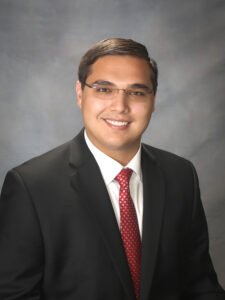
2021-2022 Precious Blood Volunteer, Aaron Wise
By Aaron Wise, Precious Blood Volunteer
I called her name. She rose slowly from her chair in the waiting room and hobbled toward me. She gifted me an enthusiastic greeting and a labored smile, that which is socially expected for decency. We entered the exam room, and I initiated the pre-provider tasks: taking vitals, gathering medical and family histories, conducting necessary point-of-care testing, etc.
Something appeared off.
Clearly, something deeper ailed my patient. I asked about her day, her holiday plans, her family. I found out the upcoming Thanksgiving would be difficult for her—the first one since losing her daughter. I asked about her daughter. I experienced my sister in Christ’s delight in sharing the memories of someone she loved so dearly. She showed me a beautiful, goofy video of her with her daughter—singing, dancing, and laughing. She teared up, a paradoxical moment of sadness and joy. Her heart was broken; from it oozed the Precious Blood, a combination of both suffering and pure love.
***************
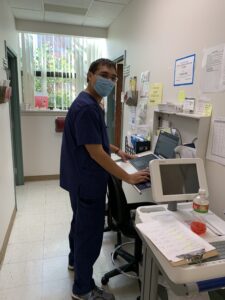
Aaron Wise, at work at KC CARE Health Center
Small drops of blood discolored the white floor. The patient had stepped on a nail in his garage, leaving a small, deep hole in his foot. I cleaned and wrapped the wound, yet this man had little concern for his foot.
He feared for his mind. He told me he wasn’t right—that something was wrong with his brain, that he was “messed up” in the head. He told me he’d done many drugs and other substances. He’d seen psychiatrists and been given many medications meant to help. None of them worked. He told me he would try one more thing, and if that didn’t work, he had “other arrangements” to take care of it.
I don’t know what this man has been through in the past. I don’t know what he is going through in the present. But I do know the life of my brother in Christ means something. He has an indelible dignity, despite the ways in which the world, those around him and he, himself, asserts that he is “messed up.”
***************
It was 2:30 on a warm Saturday afternoon. I was driving home with two friends along Independence Avenue, a busy road in Northeast Kansas City. On a patch of grass between the sidewalk and the road was a body—just yards from my residence.
I didn’t see it initially, but my friend insisted we return to check. People walked along the sidewalk, past the body. Several cars passed. From a distance, I got a better view of the man. His hat was thrown to the side, his body disheveled and uncomfortably positioned. One arm was raised and yellow. It was clear my brother in Christ was not breathing.
As we approached, a lady called out from a car to inform us she had called 911. Later, she revealed she had driven by 20 minutes prior, on a delivery. She was appalled by the indifference of hundreds of people who must have witnessed a man unwell on the side of the road. A life had passed—and nobody cared to notice.
***************
thud, thud, thud, thud, thud! It was midnight. I awoke to a cacophonous banging on our door and windows. We answered. Our neighbor frantically reported the house next to ours was on fire. We raced to the other window to witness the entire west side of the building engulfed in flames.
***************
These are but four brief stories among hundreds I’ve experienced working at the KC CARE Health Center in midtown and living in Northeast Kansas City. Interestingly, a few similar connections underly each of these stories and the many others that remain untold.
First, socioeconomic and racial barriers underpin each situation—access to health care, racism and discrimination, mental health stigmas, or scummy landlords who neglect their responsibility to respond to electrical issues. These injustices fall harder on minorities and those with less money.
Second, suffering seems to be part of the human condition. There is nothing the individuals in these stories could have done to prevent their hardship. I don’t say this ignoring the role of free will. Yes, each individual may have made choices that contributed to their situations, but the options they had available were severely screened by culture and society, among several other determinants.
Finally, God is present deeply with those who suffer. These are truths we recognize profoundly in the spirituality of the Precious Blood.
CS Lewis affirmed that heaven is an acquired taste. Jesus is my savior, and it is by His doings—not my own—that I will experience eternal life in union with God. Yet, if you were to bring me to heaven right now, I do not know if I’d like it. I still carry the taste of the world with me: pride, independence, self-servitude, sin. This contrasts with the purity and fullness of love that is heaven. However, through service and the experiences like those shared above, I’ve begun to acquire the taste of Christ. Community, simplicity, and prayer also have been formative for me during the past year.
I’ve practiced community on two levels this year: directly with those with whom I live and also with the global community.
I live with 18 others, including two families with five children, and sharing life with them has been a beautiful joy. I experience this joy in the form of sharing meals, interests, events, and time. I have countless jubilant memories such as tennis, basketball, soccer, football, Frisbee, ice skating (I love sports), faith sharing, music, etc.
In terms of the wider community, we focus on conservation, being involved in neighborhood and city policies, and living on a smaller income. Some of the practical aspects of this lifestyle are eating a vegetarian diet, consuming less water and electricity, composting, using a clothesline, paying attention to consumables and reusing when appropriate, and purchasing natural organic local products when available. There is a richness to sharing resources and life in this way.
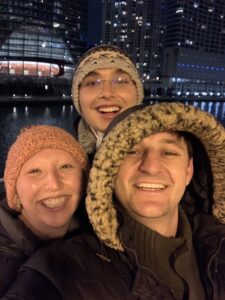
Aaron with his fellow Precious Blood Volunteers in Chicago
Simplicity is a challenging ideal when we live in a chaotic world. Despite this, I still have been able to find simplicity relative to my previous student lifestyle. I live in a house without Wi-Fi and a phone signal because I strive to remove unnecessary and empty lifestyle choices. Often when we think about simplicity, we focus on what we “give up” and an image of emptiness is invoked. In practice, it is quite the opposite! Removing the superficial and unimportant gives way to a spirit of great abundance—especially in time, relationships and charity.
Finally, prayer is the cornerstone that links everything. My relationship with God has strengthened me to participate and grow in all the ways discussed and also has been strengthened through my experiences. Daily Mass is a joyous gift and receiving the Eucharist has been fuller and more transformative through walking with others as a Precious Blood volunteer.
This year has been formative as I’ve taken little steps along a lifelong journey to acquire the taste of heaven. I invite all of you to join in along the way. As echoed at Jerusalem Farm: The way is long, let us walk together; the way is hard, let us help one another; the way is Christ, Christ is the way.
Aaron served as a Precious Blood Volunteer at KC CARE Health Center in Kansas City, Missouri. Go to preciousbloodvolunteers.org to learn more about Precious Blood Volunteers.
Apr 4, 2022
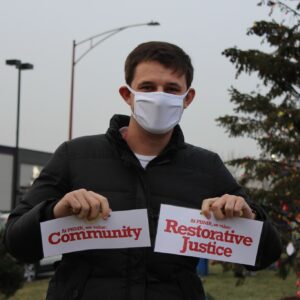 by Vincent Tedford, Precious Blood Volunteer
by Vincent Tedford, Precious Blood Volunteer
Last year, I was meditating on Christ’s Passion. Christ’s sacrifice and suffering were a focal point for all my emotions surrounding the injustices I witnessed in the world around me. Nothing else evoked the same emotion for me. However, when I became a Precious Blood Volunteer, I witnessed human suffering on a scale like never before.
In August of last year, I moved to Chicago’s Back of the Yards neighborhood to begin volunteering at the Precious Blood Ministry of Reconciliation (PBMR). Within a few hours of landing, I met and heard the stories of those wrongfully convicted and/or formerly incarcerated, the victims of gun violence, the medically underserved, and generally marginalized people with whom I would be spending my year as a Precious Blood Volunteer. I thought I knew what I was getting into, but even on day one I was surprised at the reality our PBMR community was facing.
Death and loss are in constant competition against the backdrop of hope we try to maintain at PBMR. In the forefront were the daily struggles. I went to the woodshop and worked with guys trying to make enough to get by while learning what it takes to maintain a job; showing up and staying on task often prove to be a struggle for our participants. Early on I was enlightened by the question, “How can you meet basic expectations when your basic needs are lacking?”
“I don’t have a bed. My family is taking in people all the time and I gave mine up for my brother. He’s in high school, playing sports, so I want him to have the best shot at success.” One of our participants shared this with me while talking about his own journey to a career as an athlete. This young man is willing to make sacrifices, despite the drain on his own potential, for someone else to get a leg up he never had. Something as simple as a good night’s sleep should never be taken for granted.

Vincent (front right) with his fellow Precious Blood Volunteers in Chicago
For some, the threat of violence keeps them up at night; most are experiencing perpetual trauma which would make anyone restless. Just trying to get by, living each day on high alert, and/or self-medicating are enough cause for them to fall behind. Every day at PBMR I have seen elements of this cycle in people’s lives.
I am reflecting on my life before August and how the time since then has impacted and will continue to impact me going forward. Before graduating last May, I had no image more viscerally compelling to meditate on than the Passion. Now, while I walk the streets of Back of the Yards on my way to PBMR, I feel an intense emotion being evoked.
As I take the bus to my meetings and appointments, or towards my leisure activities and outings, the reality of human suffering is present and inescapable. I realize now my life was sheltered from this pain; my vision—even though imagining the Passion was important—was limited to this far-off concept of despair. Having been drawn near to my heart through my experience, the people of the PBMR community have shown me how I must go forth in spirit to my future.
When I go to the EdLab, our room for tutoring those trying to go back and get their high school diploma, I prepare myself to encounter the students wherever their minds are. Some days I know there is nothing I can do to help someone in or out of the classroom. On others, I feel the slightest gift makes a big difference. The common factor, though, is showing up and accompanying.
When I was told that the core of this program was to walk with those who suffer, I merely drew upon my experience sitting with people in pain. Now, even though I do often sit next to students to tutor, being seated speaks nothing to the difficulty of the walk we take. The walk they must take every day and to which I merely opt-in.
One student tested my proverbial ability to walk. I often hear incoherent stories of their life and I witness their unstable condition, both physically and mentally. They often challenge my ability to respond with compassion. Accompaniment, I learned, can mean frequent stopping for breaks and reminding someone to take a breather while you keep watch for them.
One day in the EdLab, I was grading papers and supervising students while they studied. A student was talking to themselves and getting louder. I asked if they were okay which they promptly brushed off. Thankfully, one of the religious sisters had reflected on these situations for years and helped me respond. “Hey, you’re doing some great work today. I can tell you have a lot on your mind, so how about we take a break and get some water? Let me know if you want to talk, okay?”
I learned through moments like this: the little bit of discomfort I would have during an interaction with someone during bouts of schizophrenia could be pivotal to their educational progress and more importantly, demonstrate compassionately how they are a part of our community not to be neglected.
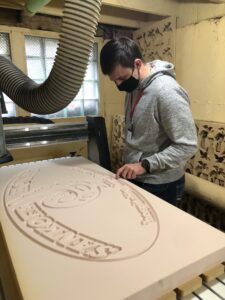
Vincent checking the quality of a piece in the PBMR wood shop
I want to keep sharing my skills with my community. Someone once said, if you want to change the world, go home and love your family. From there, serve your community, and keep carrying that out across the global community we all share. For now, my roommates and I take care of our home together and share our experiences at PBMR while supporting, reaffirming, and imparting wisdom to each other. I’m grateful to Missionaries of the Precious Blood, who support me during this year of service, the people looking out for me and my fellow volunteers, and the PBMR community, who appreciate the gifts and talents I bring.
The liberty of our communities at large is bound to the liberty of each community. Wherever I go, no matter what I do, I now know my liberty is bound to my neighbors and we can work together. Marginalized, far-off, and/or rejected, you carry within you the same Precious Blood we all share.
Vincent is serving as a Precious Blood Volunteer at Precious Blood Ministry of Reconciliation in Chicago, Illinois. Go to preciousbloodvolunteers.org to learn more about Precious Blood Volunteers.
 They appear in Jerusalem to get directions. When they arrive in Bethlehem, they give their gifts to Jesus and offer him homage. They renege on their promise to Herod after having dreams in which angels warn them Herod’s intentions are not good. They end up going home a different way. They are a group of people who appear quietly in Matthew’s Gospel, and after giving their gifts and offering homage to Jesus, they just as quietly disappear.
They appear in Jerusalem to get directions. When they arrive in Bethlehem, they give their gifts to Jesus and offer him homage. They renege on their promise to Herod after having dreams in which angels warn them Herod’s intentions are not good. They end up going home a different way. They are a group of people who appear quietly in Matthew’s Gospel, and after giving their gifts and offering homage to Jesus, they just as quietly disappear.
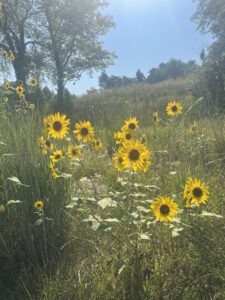
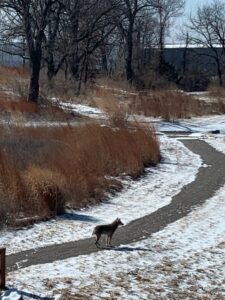
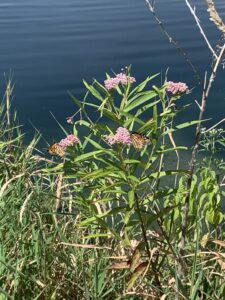
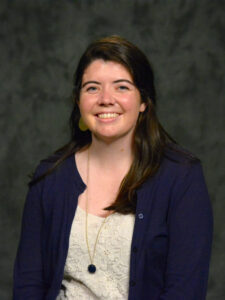
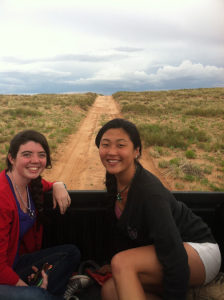
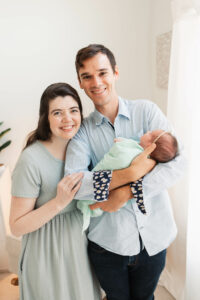
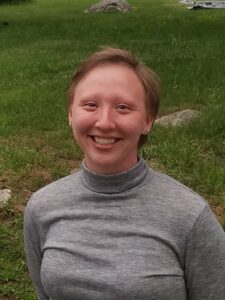
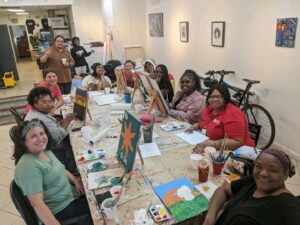
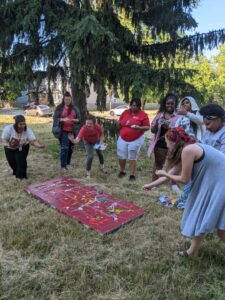 Our Zumba instructor friend talked about how important it is to find one’s joy and hold onto it. She spoke about being a Black woman, going through the process of identifying and processing trauma, and how much of a toll that has taken on her mental, physical, emotional and spiritual health. Dance brought her back into her body and allowed her to express herself in music and movement. Even in those toughest times, it was her joy.
Our Zumba instructor friend talked about how important it is to find one’s joy and hold onto it. She spoke about being a Black woman, going through the process of identifying and processing trauma, and how much of a toll that has taken on her mental, physical, emotional and spiritual health. Dance brought her back into her body and allowed her to express herself in music and movement. Even in those toughest times, it was her joy.


 by
by 